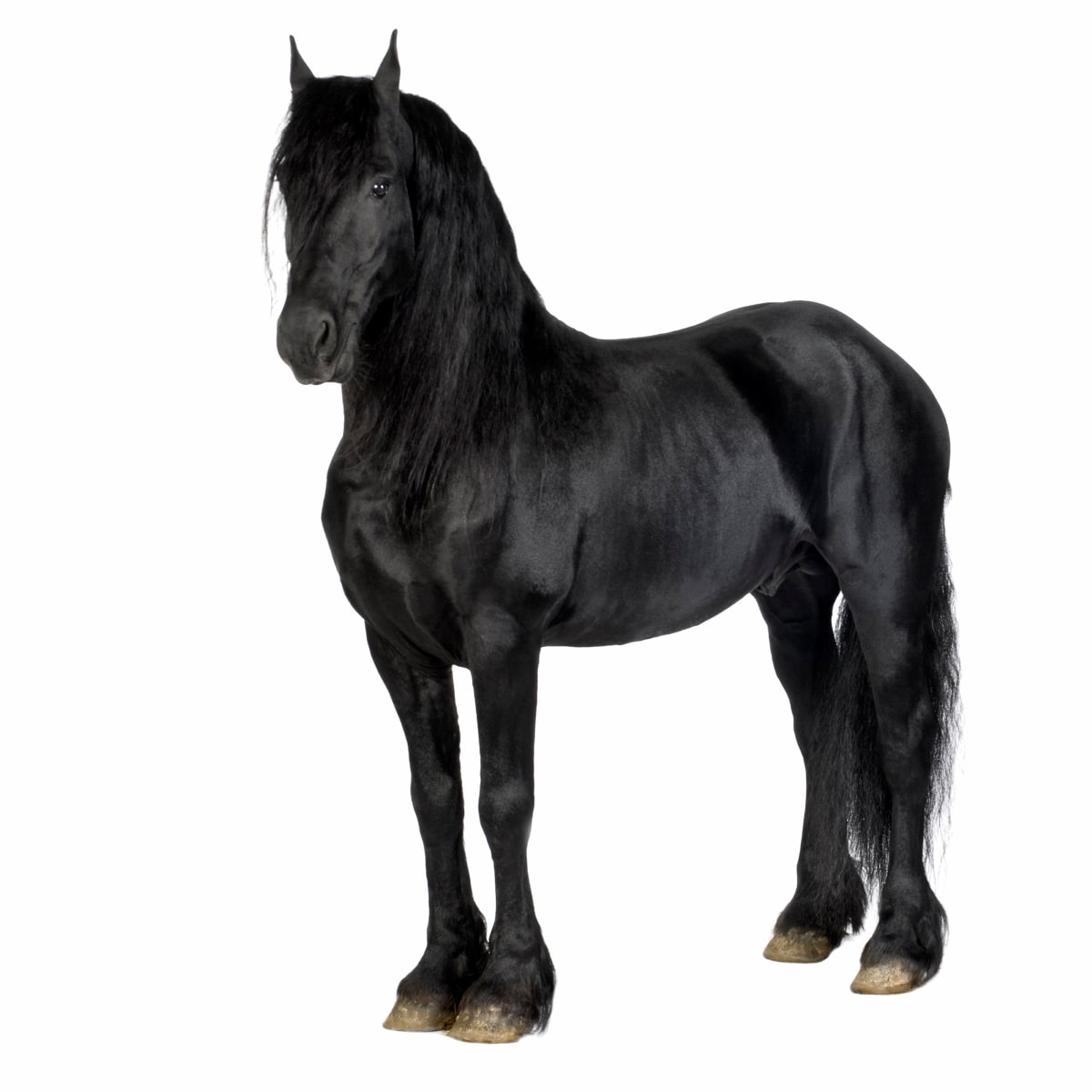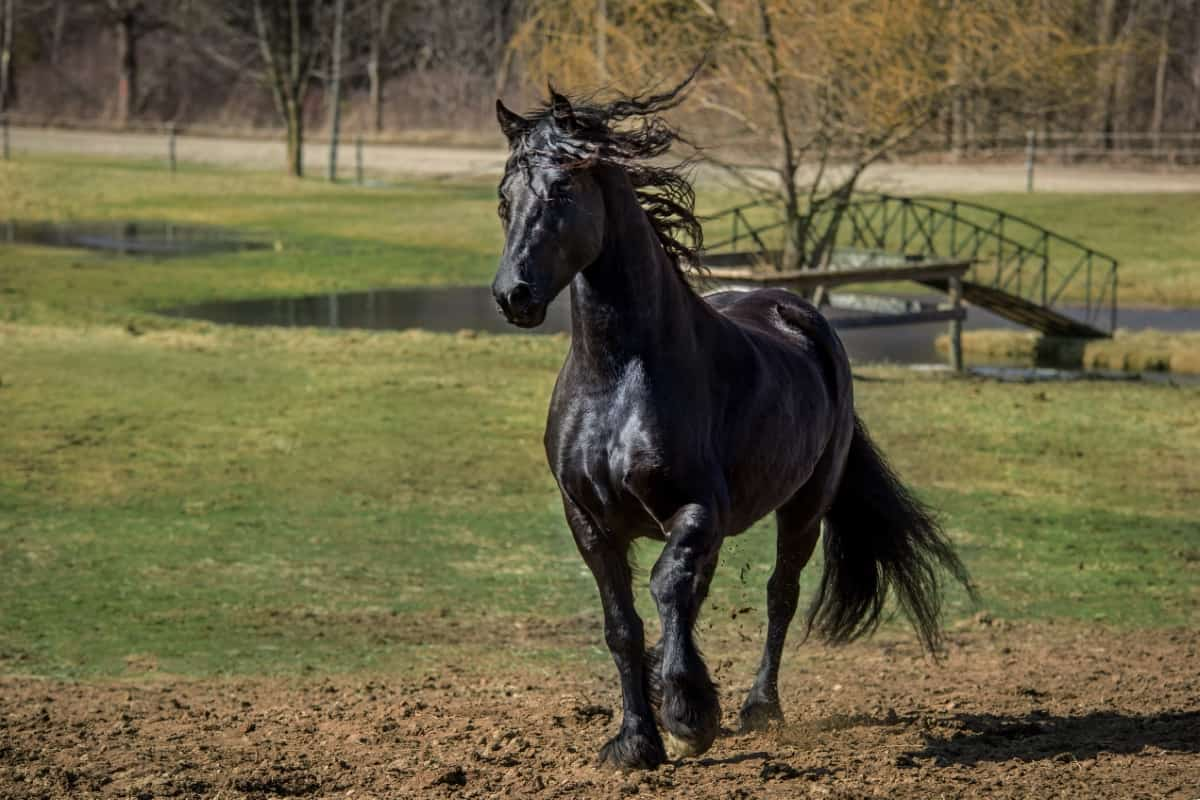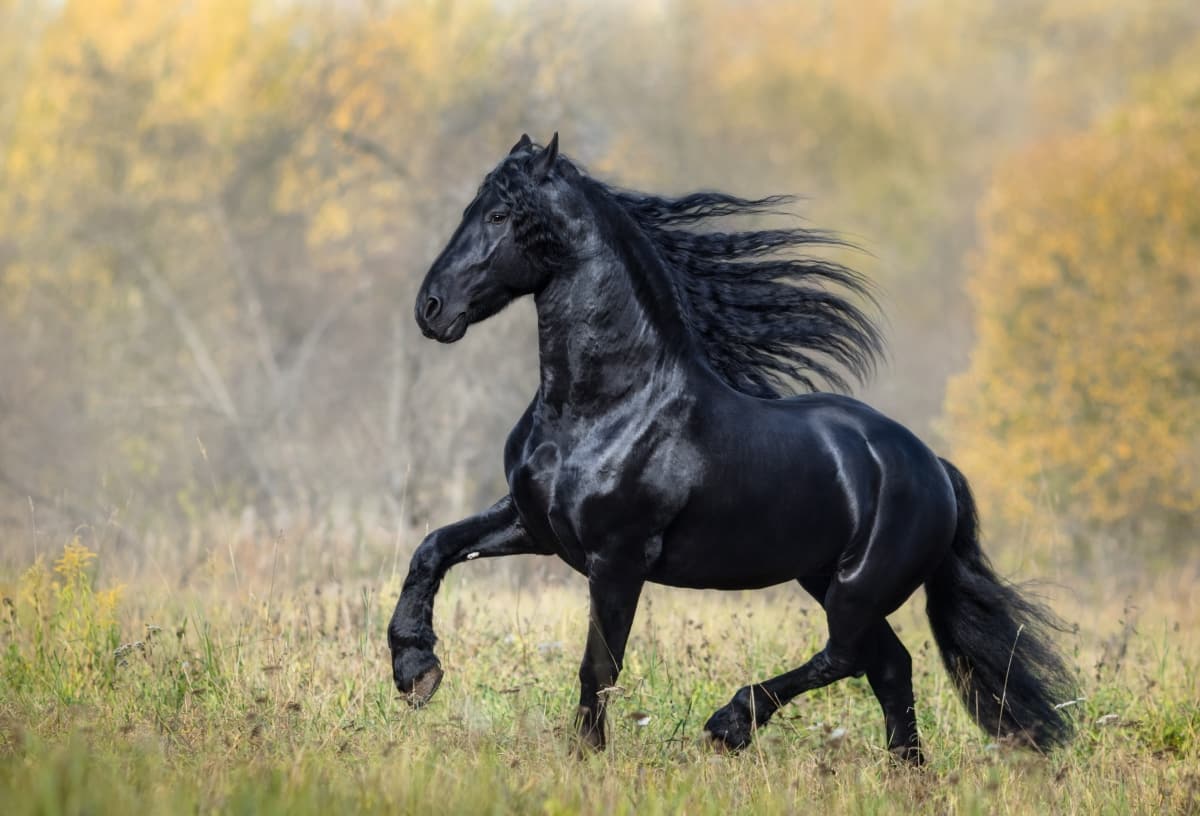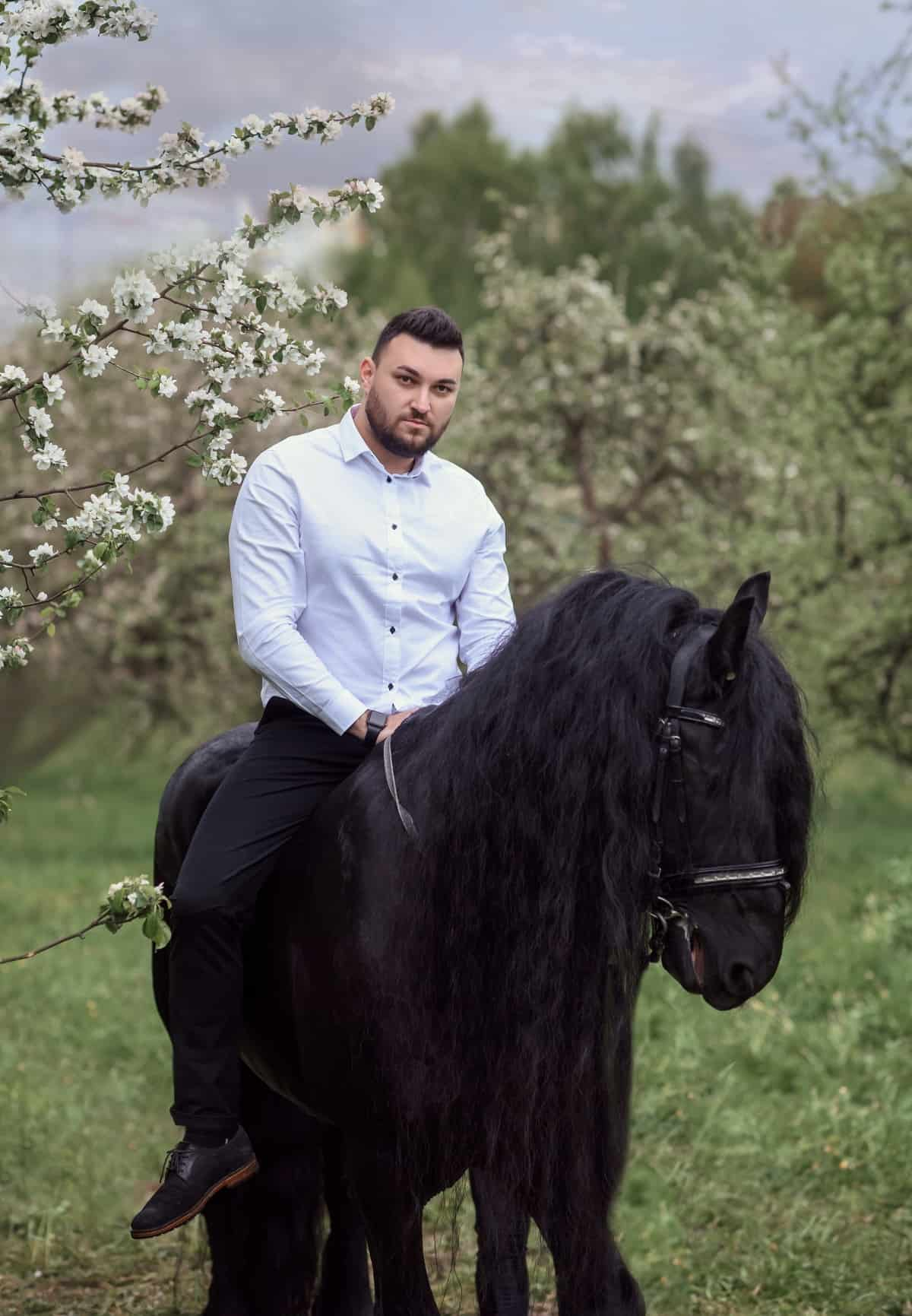Friesian horses trace their lineage back to ancient times in the Friesland region of the Netherlands, renowned for their use in battle due to their size and strength. Over the centuries, the breed has evolved but maintained its significant role in agriculture and as a status symbol in European courts. Friesian horse history is marked by periods of decline and resurgence, with concerted efforts in the 20th century aimed at preserving the breed from extinction, leading to the establishment of various Friesian horse associations and registries dedicated to their preservation.
Introduction to Friesian Horse
Breed Characteristics
Friesian horses are distinguished by their graceful demeanor, athletic build, and, most notably, their shiny black coat, which has become a defining feature of the breed. Black Friesian horse is synonymous with the breed, although rare chestnut variations can occur. The breed’s striking presence, distinguished by its elegant mane, flowing tail, leg feathering, and strong stride, positions it as a top choice for dressage and equestrian exhibitions. Friesian horse characteristics also include a robust body, strong limbs, and an expressive head with intelligent eyes, embodying the breed’s elegance and power.
Significance in Culture
Friesians have a profound significance in culture, often associated with nobility and grace. Their striking appearance and gentle nature have made them popular for ceremonial roles, film, and theater, symbolizing a regal and historic essence. Purebred Friesian horses have been featured in numerous films and cultural events, highlighting their majestic and commanding presence, captivating audiences worldwide.

Physical Characteristics
Size and Build
Friesians are large, muscular horses, typically standing between 15 to 17 hands in height and weighing approximately 1,200 to 1,400 pounds. Their size and build contribute to their impressive presence and power, making them suitable for a variety of equestrian disciplines, from dressage to driving.
Coat and Color
The Friesian’s coat is predominantly black, a trait that is rigorously maintained through breeding standards. The deep, lustrous black coat, coupled with their long, flowing mane and tail, sets them apart in the equine world. While black is the most common and desired color, chestnut Friesians exist due to genetic variations, though they are rare and not typically preferred within breed standards.
Identifying Marks
Friesians may have minimal white markings; however, breed standards generally prefer a solid coat. The breed is also known for its “feathers” – the long, silky hair on the lower legs, adding to their distinguished appearance. These identifying marks and their noble head and kind expression make the Friesian horse easily recognizable.
Temperament and Behavior
Personality Traits
Friesian horses are known for their gentle and calm disposition, making them excellent companions for riders of all levels. Their friendly and sociable nature and keen intelligence make them highly trainable and eager to please, qualities that endear them to many in the equestrian community.
Suitability for Riders
Due to their even temperament and willingness to work, Friesians are suitable for a wide range of riders, from beginners to experienced equestrians. Their versatility and adaptability in various disciplines, including dressage, driving, and pleasure riding, make them a favored choice among horse enthusiasts.
Care and Management
Feeding and Nutrition
Proper feeding and nutrition are crucial for maintaining the health and vitality of Friesian horses. Their diet should be well-balanced, consisting of quality forage, grains, and supplements as needed, tailored to their individual health requirements and workload to ensure optimal health and performance.
Grooming
Regular grooming is essential for Friesians for the health of their coat, mane, and tail and for building a bond between horse and owner. Attention to their distinctive feathers and mane requires consistent care to prevent tangling and maintain their signature look.
Health Care
Friesians are predisposed to certain health issues, such as skin conditions due to their dense mane and tail and genetic disorders like hydrocephalus and dwarfism. Routine veterinary examinations, immunizations, and parasite management are crucial components of their healthcare regimen, promoting their overall well-being and vitality.
In case you missed it: Ultimate Guide to Arabian Horse: Profile, Raising, Price, Lifespan, Diet, Uses, Training, and Care

Training and Exercise
Training Techniques
Friesian horse training should be approached with patience and consistency, utilizing positive reinforcement to capitalize on their natural willingness to learn. Early socialization and basic training lay the foundation for more advanced disciplines, making them versatile performers in various equestrian arenas.
Exercise Needs
Regular exercise is vital for Friesian horses to maintain their physical and mental well-being. A combination of turnout, structured training, and recreational riding ensures they remain fit and engaged, preventing boredom and promoting overall health.
Breeding and Genetics
Breeding Practices
Ensuring responsible breeding practices is essential for preserving the purity and well-being of the Friesian breed. Friesian horse breeders rigorously follow guidelines to uphold the breed’s genetic purity, emphasizing health, temperament, and adherence to breed standards.
Genetic Health Concerns
The Friesian breed is susceptible to certain genetic health concerns, including a higher incidence of heart problems and a condition known as Dwarfism. Breeders and researchers are continually working to identify and manage these genetic traits to improve the health and longevity of the breed, ensuring the future of these majestic horses.
Disciplines and Uses
Competitive Disciplines
Friesian horses excel in various competitive disciplines, particularly dressage, due to their elegant movements and powerful build. They are also increasingly popular in driving competitions and show jumping, showcasing their versatility and athletic ability. Friesian horse competitions often highlight their unique attributes, with specific classes dedicated to the breed in larger equestrian events.
Recreational Riding
Apart from competitive arenas, Friesian horses are cherished for recreational riding. Their calm temperament and steady gait make them ideal for leisurely rides, trail riding, and family horses. The joy of riding a Friesian horse lies in their majestic appearance and their gentle and responsive nature, making every ride a memorable experience.
Work and Performance
Beyond sports, Friesians are used in various work and performance roles. Their impressive presence and trainable temperament make them favorites in historical reenactments, theatrical performances, and carriage horses in ceremonial events. The breed’s strength and endurance also lend themselves well to farm work and other practical tasks, though they are more commonly celebrated for their performance capabilities.
Buying a Friesian Horse
Considerations Before Purchase
When considering buying a Friesian horse, it’s important to assess your riding skills, the horse’s intended use, and your ability to meet their care and maintenance needs. Understanding Friesian horse health issues and temperament can help ensure a good match, making the purchase more fulfilling for both horse and owner.
Where to Buy
Prospective buyers can find Friesian horses through reputable breeders, Friesian horse associations, and specialized auctions. Researching and visiting Friesian horse breeders or sellers is crucial to observe the horses’ conditions, ask about their history, and potentially request a pre-purchase veterinary exam to ensure their health and suitability.
Costs and Ownership
The price of a Friesian horse can vary widely, typically ranging from $3,000 for a crossbred or less distinguished lineage to over $30,000 for a purebred with top bloodlines and training. Ownership costs extend beyond the purchase price, including expenses for feeding, housing, healthcare, training, and insurance, which can amount to several thousand dollars annually.
In case you missed it: Buckskin Horse Facts: Breed Profile, Characteristics, Price, Lifespan, Diet, Uses, Training, and Care

Friesian Horse Associations and Clubs
Local and International Organizations
Numerous local and international organizations are dedicated to the Friesian horse breed, including the Friesian Horse Association of North America (FHANA) and the Koninklijke Vereniging “Het Friesch Paarden-Stamboek” (KFPS) in the Netherlands. These organizations play a crucial role in breed standards, registration, and promoting the breed globally.
Benefits of Membership
Membership in Friesian horse associations offers numerous benefits, including access to breed registries, educational resources, and participation in breed-specific events and competitions. These clubs also provide a community for Friesian horse enthusiasts to share experiences, knowledge, and the joy of owning these magnificent horses.
In case you missed it: Everything You Need to Know About Horse Grooming: Step-By-Step Guide for Beginners

Conclusion
The Friesian horse, with its majestic appearance and versatile capabilities, holds a special place in the hearts of equestrians worldwide. From their rich history and unique characteristics to their roles in competitive disciplines, recreational riding, and performance, Friesians embody grace, strength, and a deep connection with their human counterparts. Owning a Friesian horse is a commitment to excellence, tradition, and the ongoing preservation of this noble breed.
- Feed Your Flock for Less: Top 10 Tips to Save on Chicken Feed
- Ultimate Guide to Ossabaw Island Hog: Breeding, Raising, Diet, and Care
- Hatching Answers: The Top 10 Reasons Your Chickens Aren’t Laying Eggs
- Eggs and Economics: Breaking Down the Cost of Raising Backyard Chickens
- Defend Your Greens: Proven Methods to Keep Iguanas Out of Your Garden
- Ultimate Guide to Cinnamon Queen Chicken: A Comprehensive Guide for Beginners
- Ultimate Guide to California Tan Chicken: Breeding, Raising, Diet, Egg-Production and Care
- Ultimate Guide to Marsh Daisy Chicken: Breeding, Raising, Diet, and Care
- 10 Types of Chicken Farming Businesses You Can Start for Profits